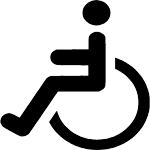Sections of RPwD Act, 2016 related with the Accessibility
40. Accessibility
The Central Government shall, in consultation with the Chief Commissioner, formulate rules for persons with disabilities laying down the standards of accessibility for the physical environment, transportation, information and communications, including appropriate technologies and systems, and other facilities and services provided to the public in urban and rural areas.
41. Access to Transport
1) The appropriate Government shall take suitable measures to provide—
- facilities for persons with disabilities at bus stops, railway stations and airports conforming to the accessibility standards relating to parking spaces, toilets, ticketing counters and ticketing machines;
- access to all modes of transport that conform the design standards, including retrofitting old modes of transport, wherever technically feasible and safe for persons with disabilities, economically viable and without entailing major structural changes in design;
- accessible roads to address mobility necessary for persons with disabilities.
(2) The appropriate Government shall develop schemes programmes to promote the personal mobility of persons with disabilities at affordable cost to provide for
- incentives and concessions;
- retrofitting of vehicles; and
- personal mobility assistance.
42. Access to information and communication technology
The appropriate Government shall take measures to ensure that
- all contents available in audio, print and electronic media are in accessible format;
- persons with disabilities have access to electronic media by providing audio description, sign language interpretation and close captioning;
- electronic goods and equipment which are meant for everyday use are available in universal design.
43. Consumer goods.
The appropriate Government shall take measures to promote development, production and distribution of universally designed consumer products and accessories for general use for persons with disabilities.
44. Mandatory observance of accessibility norms
(1) No establishment shall be granted permission to build any structure if the building plan does not adhere to the rules formulated by the Central Government under section 40.
(2) No establishment shall be issued a certificate of completion or allowed to take occupation of a building unless it has adhered to the rules formulated by the Central Government.
45. Time limit for making existing infrastructure and premises accessible and action for
that purpose.
(1) All existing public buildings shall be made accessible in accordance with the rules formulated by the Central Government within a period not exceeding five years from the date of notification of such rules: Provided that the Central Government may grant extension of time to the States on a case to case basis for adherence to this provision depending on their state of preparedness and other related parameters.
(2) The appropriate Government and the local authorities shall formulate and publish an action plan based on prioritisation, for providing accessibility in all their buildings and spaces providing essential services such as all primary health centres, civil
hospitals, schools, railway stations and bus stops.
46. Time limit for accessibility by service providers.
The service providers whether Government or private shall provide services in accordance with the rules on accessibility formulated by the Central Government under section 40 within a period of two years from the date of notification of such rules: Provided that the Central Government in consultation with the Chief Commissioner may grant extension of time for providing certain category of services in accordance with the said rules.














